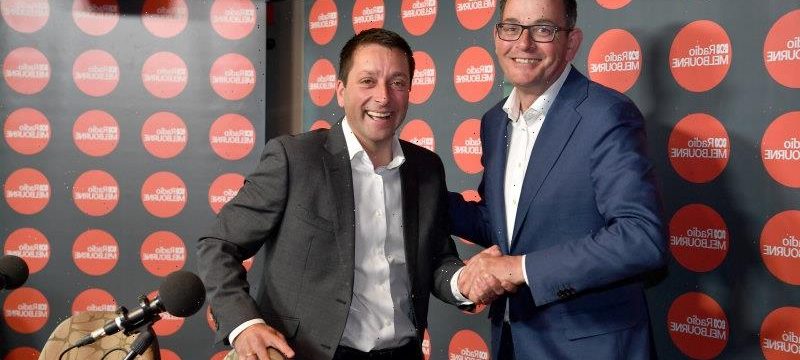This is part of our Victorian election series “Talkback”, featuring legendary broadcasters Jon Faine and Neil Mitchell’s takes on the campaign every Sunday. Read Mitchell’s piece here.
There is a real prospect that we are witnessing an election campaign without proper debate. Is this race to the ballot box providing scant opportunity to test the political smarts of those who want to run the state?
At the time of writing, with only a few weeks to go, there is still no agreement between the parties for even one leaders’ debate on radio, TV or at a community forum. Senior ministers and their shadows ought similarly to be committing to open public contests where voters have an opportunity to speak directly to those who seek to govern our lives.
Daniel Andrews and Matthew Guy at ABC Radio Melbourne after their 2018 campaign debate.Credit:Joe Armao
This campaign is proving to be as stage-managed as any. Minders and spin-doctors vet everything, scout every location, plan each move.
It is trite but worthwhile to observe that every election campaign is different to every other campaign. In a world of accelerating change, techniques and strategies that achieved miracles last election can be as useless as a dot matrix printer ribbon today.
Four years ago, Matthew Guy was campaigning on African “gangs” as the biggest issue for Victorians. The then Home Affairs Minister Peter Dutton chimed in and claimed Melburnians “were scared to go out for dinner”.
This election, Peter Dutton is leader of the federal Liberal Party, but his contribution to the state campaign seems unwelcome.
Federal Opposition Leader Peter Dutton will not appear on the campaign trail with Victorian Opposition Leader Matthew Guy.Credit:The Age
Last time, Daniel Andrews promised more level-crossing removals and to fix the state’s over-stretched hospital and ambulance systems. He has delivered on the former but comprehensively failed on the latter.
His claims that COVID and the pandemic are to blame are unconvincing, as the problems were crystallising long before COVID emerged from a Wuhan wet market.
The ALP’s campaign radar is much more finely tuned than the opposition’s. It’s like the A team competing against beginners. A social media strategy targeting millennials that is funny, creative and energetic is outrunning the Liberal’s social media campaign, which so far has shown all the hallmarks of being approved by a committee of dinosaurs.
But slogans, cute videos and tweets only go so far. At some point, there is a need for detailed scrutiny, of the type that only well-researched and bold inquiry can provide. That is why all the major media outlets have specialist state political journalists, who are itching to have a decent crack at the leaders.
Journalists at a press conference held by Victorian Premier Daniel Andrews.Credit:Getty Images
Will Andrews take the risk of giving his opponent oxygen by debating him live-to-air on radio or TV?
Liberal headquarters are seeking multiple debates between Guy and the premier. They have nothing to lose, as they are behind in all the polls. The premier has so far refused to commit. A good performance by Guy in a head-to-head debate is his best – or is it his only? – chance to bridge the gap that persists as pre-poll voting looms.
The only way to avoid the appearance of dodging debates is to do them. For Andrews, there is little upside to agreeing to a debate and potentially much to lose. In a way, Andrews legitimises Guy by sharing a platform with him.
In the 2018 campaign, the same two leaders faced each other twice for TV and radio audiences. One of those encounters was for 30 minutes on the ABC radio program that I then hosted each morning.
They had both been regular guests before the poll and the week before we voted, and neither took a backward step as D-day approached.
They were cordial, well-prepared, occasionally funny and efficient in their lines of attack – and the audience was better informed for it. So why the reluctance to commit in 2022? A charitable analysis would put the delay down to brinkmanship, or more likely an attempt to control the narrative and the tactical stage.
A possible explanation for the reluctance of the ALP HQ to participate in other portfolio policy debates lies in the spectacular renewal of the Andrews ministry just four months ago. The synchronised departures of Martin Foley, Dick Wynne, Lisa Neville and Martin Pakula left four new ministers in those sensitive portfolios of health, planning, police and major events.
Is the ALP’s strategy to shield the newly minted ministers from being tested in portfolios they are still learning?
In which case, what is stopping the longstanding Treasurer Tim Pallas from debating his shadow, David Davis? Both have been around the parliament in various roles for decades and neither lack presence nor confidence. Victoria’s finances and the respective job creation proposals of each major party are critical for us all and need to be ventilated and tested.
In case multiple overseas examples are not enough of a reminder, democracy is like a muscle: use it or lose it.
The Morning Edition newsletter is our guide to the day’s most important and interesting stories, analysis and insights. Sign up here.
Most Viewed in Politics
From our partners
Source: Read Full Article



